 Hello, gentle readers, and welcome to the RPG Reload, the weekly feature where we beat up kappa and eat up kappamaki. Friends, you do not want to mix those things up, I assure you. Each week, we take a look at an RPG from the App Store’s past to give it another spin. It’s a chance to revisit old favorites, check up on games that might have seen some improvements over time, or even just to take a deeper dive on particularly interesting titles. As the leader of this particular party, I try to balance out the schedule with a wide variety of RPGs. That said, every person has their own biases, so to make sure nothing gets left behind, I throw the choice to you, the readers, once per month. Simply let me know your suggestion by commenting below, posting in the Official RPG Reload thread in the forums, or tweeting me at @RPGReload. I randomly choose the winner, so anyone has a chance! The next reader’s choice article is coming up in a couple of weeks, so be sure to get your selection in soon.
Hello, gentle readers, and welcome to the RPG Reload, the weekly feature where we beat up kappa and eat up kappamaki. Friends, you do not want to mix those things up, I assure you. Each week, we take a look at an RPG from the App Store’s past to give it another spin. It’s a chance to revisit old favorites, check up on games that might have seen some improvements over time, or even just to take a deeper dive on particularly interesting titles. As the leader of this particular party, I try to balance out the schedule with a wide variety of RPGs. That said, every person has their own biases, so to make sure nothing gets left behind, I throw the choice to you, the readers, once per month. Simply let me know your suggestion by commenting below, posting in the Official RPG Reload thread in the forums, or tweeting me at @RPGReload. I randomly choose the winner, so anyone has a chance! The next reader’s choice article is coming up in a couple of weeks, so be sure to get your selection in soon.
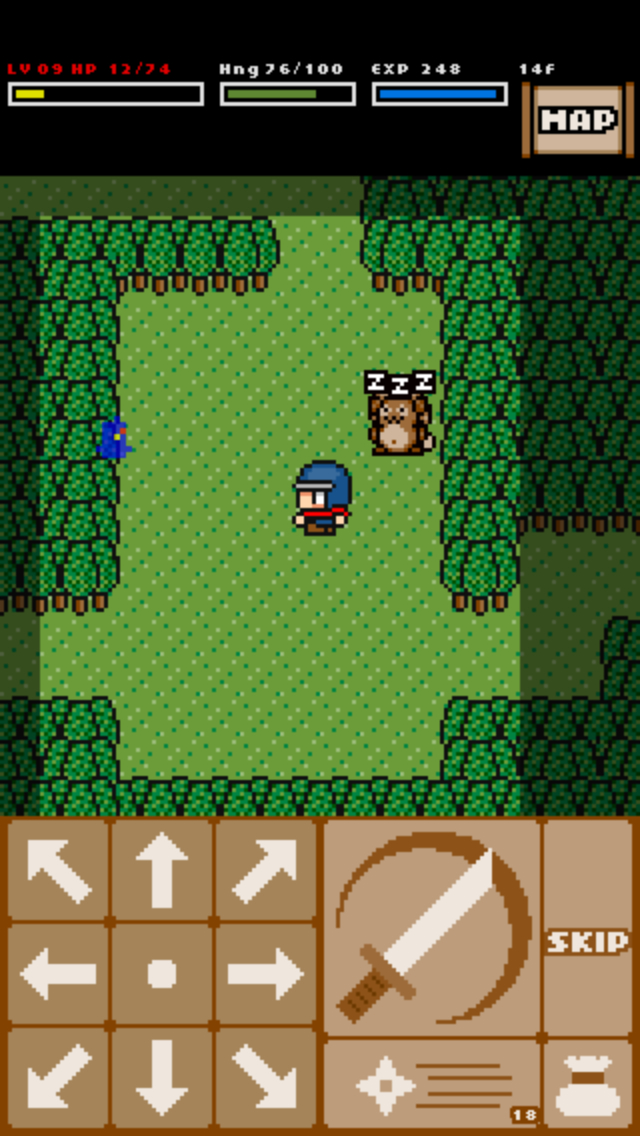 This week we’re continuing with this month’s theme of lighter RPGs by taking a look at Q-Cumber Factory’s charming Rogue Ninja ($2.99). The weather is warming up, and it’s time to shake off a bit of the winter dust by heading outside and enjoying that wonderful month where it’s neither too cold nor too hot. That doesn’t mean we have to stop gaming, but it definitely calls for something a little less time-consuming than our normal quests. Given that theme, many of you could probably guess that a roguelike was going to show up this month. They’re truly a perfect mix of depth and rapid-fire play, well-suited to those periods where you don’t have big chunks of time for goofing off. There are tons of roguelikes on iOS, with a major boom in the last two years in particular. The genre was born in the west, and has had its ups and downs in terms of escaping its niche. During one of the genre’s longer dormant periods in the west, something funny happened in Japan.
This week we’re continuing with this month’s theme of lighter RPGs by taking a look at Q-Cumber Factory’s charming Rogue Ninja ($2.99). The weather is warming up, and it’s time to shake off a bit of the winter dust by heading outside and enjoying that wonderful month where it’s neither too cold nor too hot. That doesn’t mean we have to stop gaming, but it definitely calls for something a little less time-consuming than our normal quests. Given that theme, many of you could probably guess that a roguelike was going to show up this month. They’re truly a perfect mix of depth and rapid-fire play, well-suited to those periods where you don’t have big chunks of time for goofing off. There are tons of roguelikes on iOS, with a major boom in the last two years in particular. The genre was born in the west, and has had its ups and downs in terms of escaping its niche. During one of the genre’s longer dormant periods in the west, something funny happened in Japan.
In late 1992, workhorse developer Chun Soft had just finished their job on the latest Dragon Quest game, Dragon Quest 5 ($14.99). It would end up being their last work on the main series, as they wanted to spread their wings and work on their own original titles. They still had some contributions to make to the brand, however. As in America at the time, certain hardcore players were still playing variations on the 1980 PC game Rogue, and some of those players happened to be developers. One such Rogue fan was a staff member at Chun Soft, and likely told tales of his exploits to his co-workers, catching the attention of Chun Soft’s head, Koichi Nakamura. According to an interview with Jeremy Parish at the now-defunct 1up.com, Nakamura played Rogue for a week straight and couldn’t figure out what was supposed to be fun about it. After that, it started to click, and he had the idea of doing for Rogue what Dragon Quest ($2.99) had done for Wizardry and Ultima. He wanted to take its core concepts and make it easier to understand and more approachable for the masses. Amusingly, he would do that under the umbrella of the Dragon Quest brand with 1993’s Torneko’s Big Adventure: Mystery Dungeon, a spin-off starring the lovable merchant from Dragon Quest 4 ($14.99).
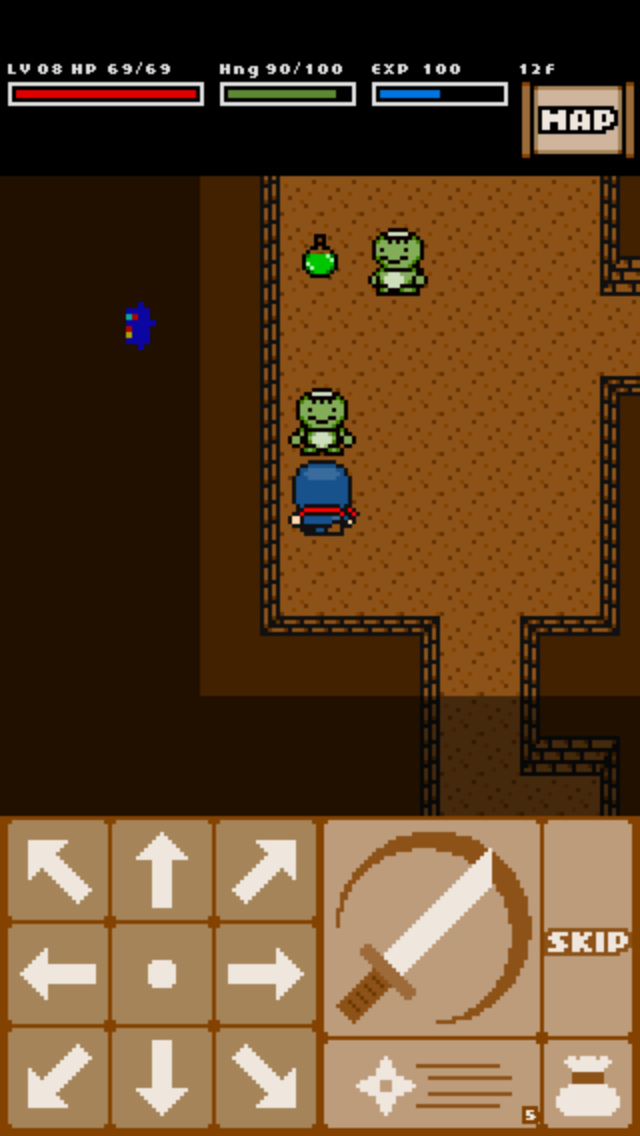 While Mystery Dungeon was still a ruthless game in a lot of ways, it wasn’t nearly as intimidating as its inspiration. Bright, colorful graphics replaced the ASCII-based dungeons of most contemporary western roguelikes, with new areas signaled by a change in the backgrounds. The number of items and monsters was much smaller, and your hero’s possible actions and interactions were cut down to a small handful. There were few instant deaths, with danger mostly coming from enemies taking big chunks out of your hit points. Still, much of the core remained. Death was essentially permanent, a wide variety of items you found had to be identified one way or another before you knew what they would do, you had to eat every so often or you would perish, and you were still looking for staircases in randomly-generated levels. Importantly, the game was still turn-based and played out on what amounts to a grid. The game was easy to pick up for newcomers to the genre, yet offered just as much tension, frustration, and satisfaction as the original Rogue.
While Mystery Dungeon was still a ruthless game in a lot of ways, it wasn’t nearly as intimidating as its inspiration. Bright, colorful graphics replaced the ASCII-based dungeons of most contemporary western roguelikes, with new areas signaled by a change in the backgrounds. The number of items and monsters was much smaller, and your hero’s possible actions and interactions were cut down to a small handful. There were few instant deaths, with danger mostly coming from enemies taking big chunks out of your hit points. Still, much of the core remained. Death was essentially permanent, a wide variety of items you found had to be identified one way or another before you knew what they would do, you had to eat every so often or you would perish, and you were still looking for staircases in randomly-generated levels. Importantly, the game was still turn-based and played out on what amounts to a grid. The game was easy to pick up for newcomers to the genre, yet offered just as much tension, frustration, and satisfaction as the original Rogue.
Torneko’s Big Adventure: Mystery Dungeon spawned a series that still lives to this day under various names. The games often feature characters from other companies and franchises, including Nintendo’s Pokemon, Square Enix’s Chocobo, Namco Bandai’s Druaga and Gundam, Konami’s TwinBee, and most recently, Atlus’s Etrian Odyssey. Chun Soft also makes Mystery Dungeon games featuring their own original character, Shiren The Wanderer. Beyond Chun Soft, the Mystery Dungeon series also essentially created the Japanese branch of roguelikes, much like Dragon Quest did with JRPGs. Chances are good that if you play a roguelike from Japan, it will be an awful lot like Mystery Dungeon. That finally brings us back around to Rogue Ninja, a ninja-themed roguelike that’s about as straight a take on the Mystery Dungeon concept as you can get, outside of something Chun Soft designed themselves.
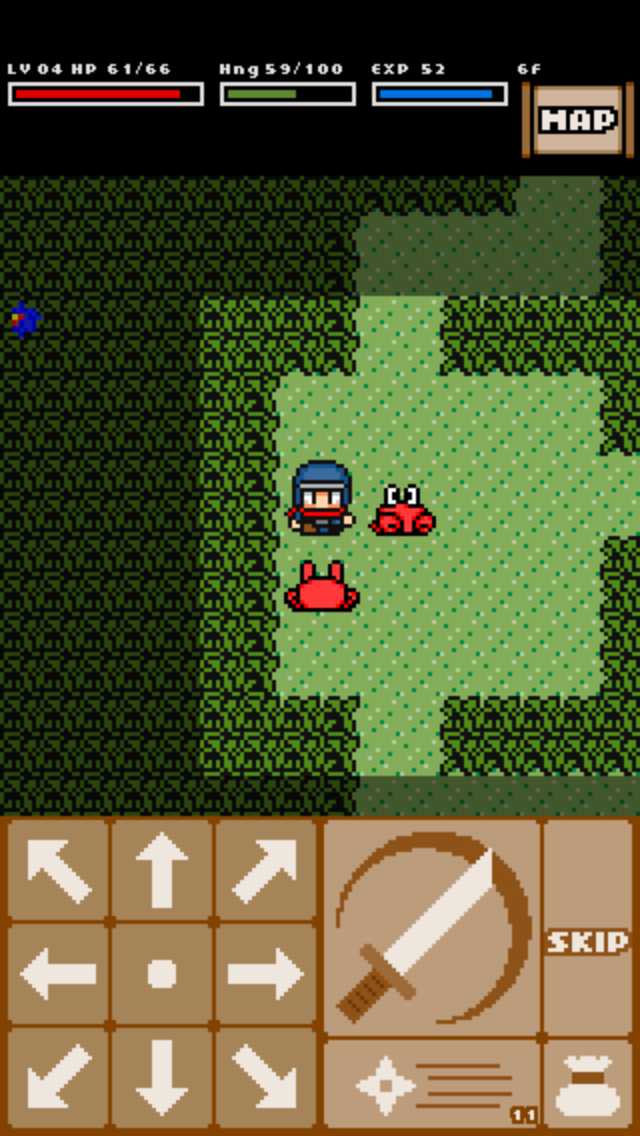 Rogue Ninja is the work of Q-Cumber Factory, a small indie developer based in Funabashi, Japan. It was largely created by one person, a man by the name of Mr. Sato, and it’s no surprise that he’s a big fan of Chun Soft’s Mystery Dungeon games. In a brief interview I had with him earlier today, he told me of how he loved playing the Game Boy installment of Shiren The Wanderer, released only in Japan in 1996. When he got his first iOS device, he immediately thought a game like that would be a good fit, and searched the App Store for something similar to it. When he couldn’t find anything, he decided to make his own. He chose to use a ninja theme because he thought it would resonate well with players around the world. In total, the game was in development for about one year before its release in April of 2012. While it largely went unnoticed by the western media, nothing slips by the TouchArcade forums, where it enjoyed a small but satisfied following.
Rogue Ninja is the work of Q-Cumber Factory, a small indie developer based in Funabashi, Japan. It was largely created by one person, a man by the name of Mr. Sato, and it’s no surprise that he’s a big fan of Chun Soft’s Mystery Dungeon games. In a brief interview I had with him earlier today, he told me of how he loved playing the Game Boy installment of Shiren The Wanderer, released only in Japan in 1996. When he got his first iOS device, he immediately thought a game like that would be a good fit, and searched the App Store for something similar to it. When he couldn’t find anything, he decided to make his own. He chose to use a ninja theme because he thought it would resonate well with players around the world. In total, the game was in development for about one year before its release in April of 2012. While it largely went unnoticed by the western media, nothing slips by the TouchArcade forums, where it enjoyed a small but satisfied following.
It’s a surprisingly strong take on the concept given its humble roots. The Mystery Dungeon games have only seen sporadic releases in English aside from the Pokemon titles, which deliberately spike the difficulty down to a near-minimum so that kids can enjoy them. Of all of the games we have seen officially released in English, Rogue Ninja most closely resembles the Nintendo DS release of Mystery Dungeon: Shiren The Wanderer, though not quite as complex in a few ways. There are no towns, no safe place to store items, and no helper characters will join you. If you die, that’s it. Nothing carries over at all. That makes the game sound more difficult, but it has ways of compensating for those things. Notably, there are three different difficulty settings that you can play on, though you have to finish one before the next will unlock.
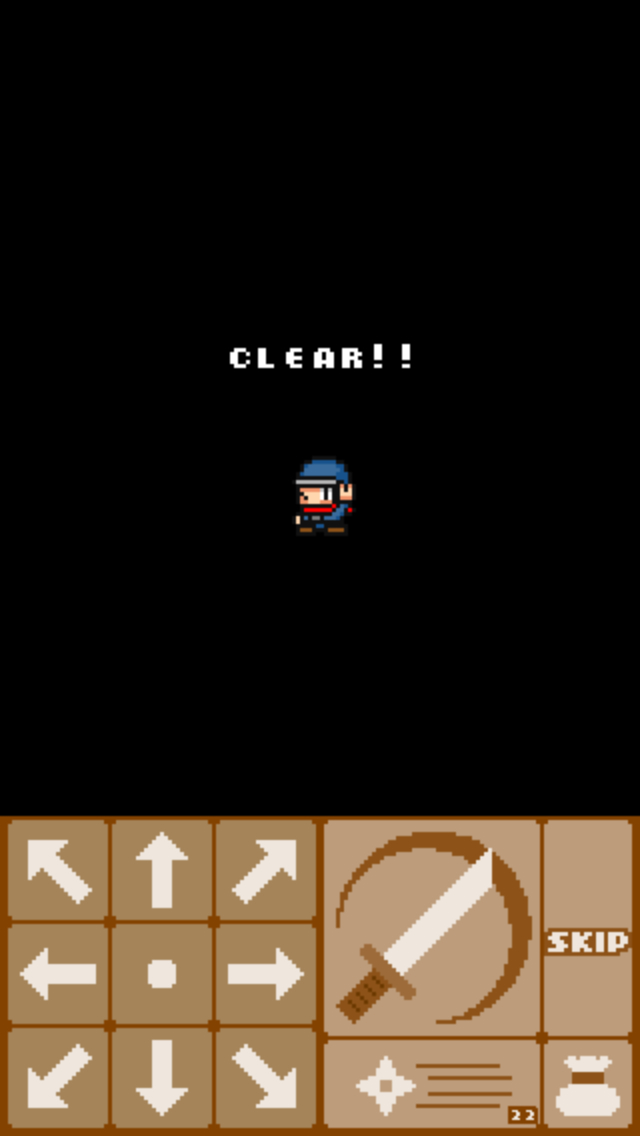 The first difficulty has you seeking a scroll that you’ll find about ten floors down. It’s a nice introduction to the game, and the enemies never pull out any truly nasty tricks. You can almost just run down to the bottom if you have a little luck on your side. Things heat up a bit in the normal difficulty campaign, which sets you on a mission to rescue a princess. You’ll need to go twice as deep here compared to the easy dungeon. That might not seem so bad, but with new floors come new enemies, and the game makes it pretty clear it’s no longer fooling around. Food is more scarce, cursed items appear more often, and the new enemies hit hard and inflict frequent status ailments that can take you from healthy to dead with a single bad move. This dungeon should provide a reasonable challenge to most players who have a decent understanding of the genre, but it’s pretty lenient by most standards. The real whammy is saved for the hard dungeon, which tasks you with the job of killing the evil Tengu King. Even veterans of these kinds of games will find this to be a tough nut to crack. Once you do manage it, you can try it again to see if you can do it better. The game keeps track of your best scores on each run, separated by dungeon.
The first difficulty has you seeking a scroll that you’ll find about ten floors down. It’s a nice introduction to the game, and the enemies never pull out any truly nasty tricks. You can almost just run down to the bottom if you have a little luck on your side. Things heat up a bit in the normal difficulty campaign, which sets you on a mission to rescue a princess. You’ll need to go twice as deep here compared to the easy dungeon. That might not seem so bad, but with new floors come new enemies, and the game makes it pretty clear it’s no longer fooling around. Food is more scarce, cursed items appear more often, and the new enemies hit hard and inflict frequent status ailments that can take you from healthy to dead with a single bad move. This dungeon should provide a reasonable challenge to most players who have a decent understanding of the genre, but it’s pretty lenient by most standards. The real whammy is saved for the hard dungeon, which tasks you with the job of killing the evil Tengu King. Even veterans of these kinds of games will find this to be a tough nut to crack. Once you do manage it, you can try it again to see if you can do it better. The game keeps track of your best scores on each run, separated by dungeon.
I think it’s pretty interesting that the developer intended to use the ninja character as something of a cultural bridge, because the rest of the game couldn’t be more foreign to those outside of Japan if it tried. The food you pick up is all different types of sushi, the swords are named after Japanese blades, and almost all of the monsters are Japanese yokai, mythological creatures that feature in many Japanese folk tales. If you’re up on Japanese culture, you’ll actually have a bit of a leg up here since, for example, you’ll know the general power differences between kunai, kodachi, and katana without risking getting cursed by trying them on. Or if you know tanuki in the mythological sense, you’ll know to watch out for their magic tricks and disappearing acts. If you don’t know, it’s not a big deal. Roguelikes are all about learning, after all.
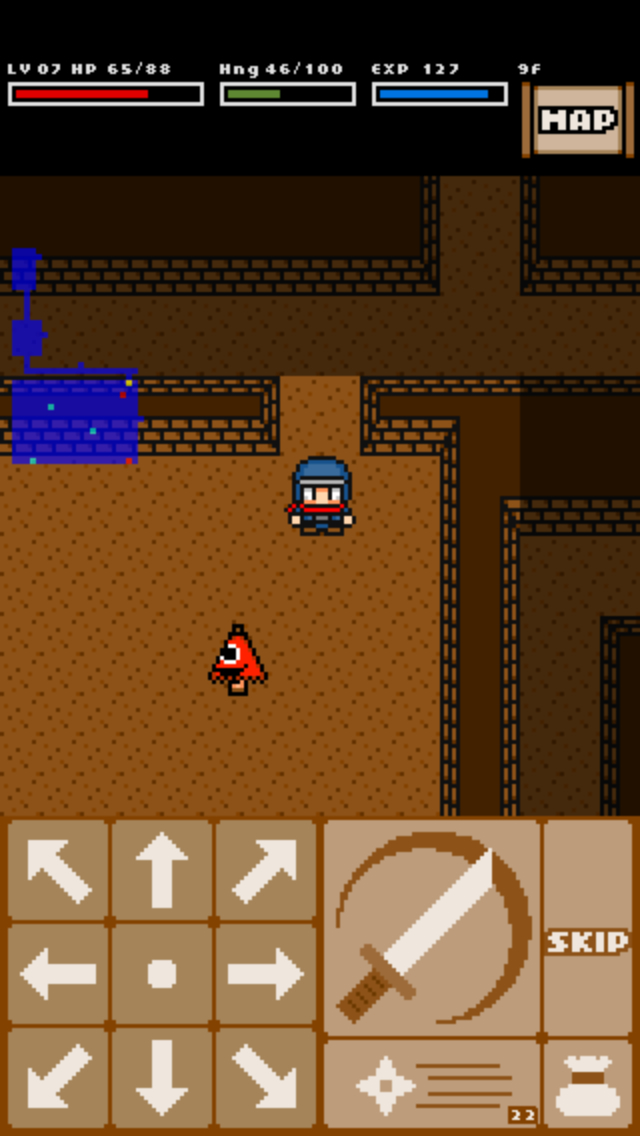 Equippable gear includes swords, armor, shuriken, and charms, and when you come across any of them in the dungeon, they’ll without fail be unidentified. If you have an item to identify them, you can do it safely, but otherwise, there’s nothing for it but to try it on and see what happens. As soon as you equip something, you can see its full details, but if it’s cursed, you won’t be able to take it off until you find a way to break that curse. In addition to this gear, you’ll also find potions, scrolls, and amulets. Unlike many roguelikes, these items are always clear about what they can do, so there’s no need to identify them. They’ll either have positive or negative effects, including things like poison, confusion, healing, random teleportation, and so on. You’ll want to throw negative potions at enemies most of the time, though there are certain other ways to use them if you’re clever. Your inventory space is limited, and as they say, you can’t take it with you, so you’re encouraged to use items frequently. There’s a pretty large variety of these items to find, so you never quite know what tools you’ll have to work with.
Equippable gear includes swords, armor, shuriken, and charms, and when you come across any of them in the dungeon, they’ll without fail be unidentified. If you have an item to identify them, you can do it safely, but otherwise, there’s nothing for it but to try it on and see what happens. As soon as you equip something, you can see its full details, but if it’s cursed, you won’t be able to take it off until you find a way to break that curse. In addition to this gear, you’ll also find potions, scrolls, and amulets. Unlike many roguelikes, these items are always clear about what they can do, so there’s no need to identify them. They’ll either have positive or negative effects, including things like poison, confusion, healing, random teleportation, and so on. You’ll want to throw negative potions at enemies most of the time, though there are certain other ways to use them if you’re clever. Your inventory space is limited, and as they say, you can’t take it with you, so you’re encouraged to use items frequently. There’s a pretty large variety of these items to find, so you never quite know what tools you’ll have to work with.
That unpredictability makes it a fun challenge every time, and the relatively short length of time it takes to do a run makes it easy to fit into even the busiest schedule. That said, one of the things I like about Rogue Ninja, and Japanese roguelikes in general, is that they’re not over too quickly even if you have bad luck. You can always count on at least a little bit to chew on, and I’d think it’s exceptionally rare to die in a matter of seconds the way you can in most western roguelikes. Beyond the familiar gameplay, I also love the graphics in this game. They’re cute, nostalgic, and most importantly, very clear. Enemies are easy to tell apart at a glance, and manage to look like what they’re supposed to even with a fairly low number of colors and pixels in play. I can take or leave the music, but the developer was at least kind enough to include the ability to replace it with your own music or podcast as you see fit. That really ought to be a basic feature in any iOS game, if you ask me.
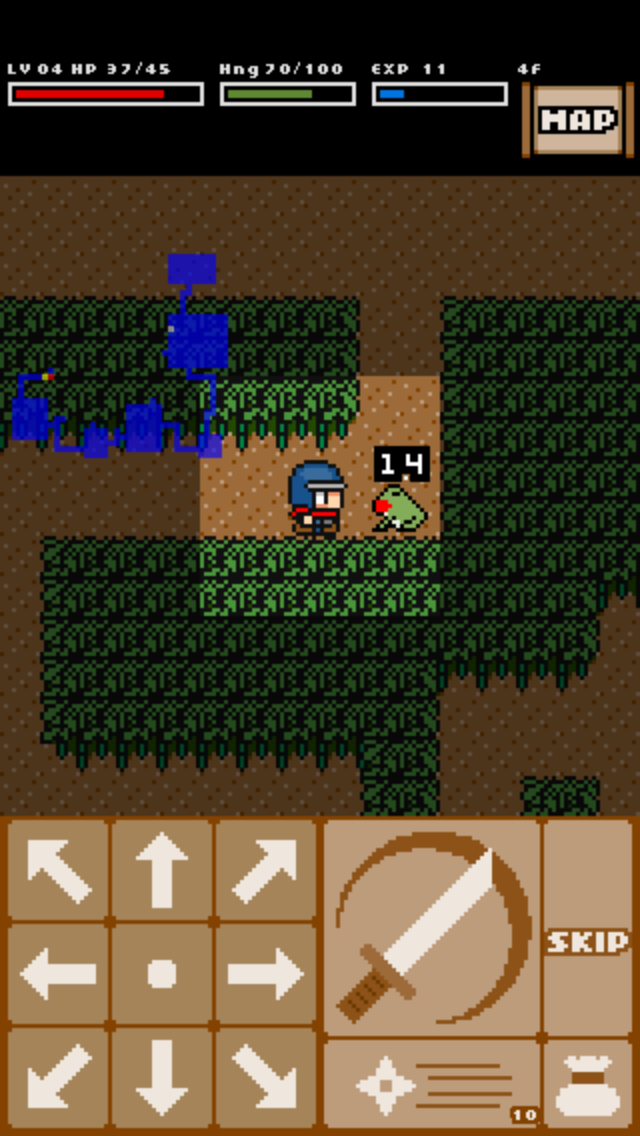 The trick of the game, as in most roguelikes, is balancing your need to become stronger with the ever-increasing risks of exploration. If you just rush for the stairs every time, you’ll eventually run into something you can’t avoid and are too weak to kill. If you scour every level for all the goodies and enemies, you’ll probably run out of food and die of hunger. There are traps you might trip, deadly enemies who might get the drop on you, and more. The greater strategy here is very satisfying, but the game is also very enjoyable in the moment. There are very few moments in gaming quite so satisfying as escaping death by the skin of your teeth when the proverbial spit hits the fan in a roguelike. It gives you honest-to-goodness stories to tell, and the energy and pride to actually tell them to other people. That’s the true strength of a roguelike, and Rogue Ninja exemplifies it well.
The trick of the game, as in most roguelikes, is balancing your need to become stronger with the ever-increasing risks of exploration. If you just rush for the stairs every time, you’ll eventually run into something you can’t avoid and are too weak to kill. If you scour every level for all the goodies and enemies, you’ll probably run out of food and die of hunger. There are traps you might trip, deadly enemies who might get the drop on you, and more. The greater strategy here is very satisfying, but the game is also very enjoyable in the moment. There are very few moments in gaming quite so satisfying as escaping death by the skin of your teeth when the proverbial spit hits the fan in a roguelike. It gives you honest-to-goodness stories to tell, and the energy and pride to actually tell them to other people. That’s the true strength of a roguelike, and Rogue Ninja exemplifies it well.
In the three years since its release, Rogue Ninja has received a number of updates both to keep it up to date with current hardware and iOS versions and to add new features. The third dungeon was added a couple of months after the game’s initial launch along with the leaderboards. Retina and universal support were both added in fairly quickly, and the leaderboards even ended up going online a year and a half later. The most recent update was only last month, so I think it’s safe to say we can count on this game hanging around for a while to come. As for the Ninja, he also appears in Ninja Striker! ($0.99) and Ninja Smasher! ($3.99), but they’re both very different games from this one. I have it on pretty good authority that Q-Cumber Factory will be revisiting the roguelike genre again, but without their Ninja character. I’m quite looking forward to it, because even after three years and a huge boom in roguelike development, there aren’t very many examples of the Japanese branch of the roguelike family tree on iOS. At the moment, Rogue Ninja is probably the best of them, so we’ll see if Q-Cumber can beat their own high score.
That’s just my take on Rogue Ninja, though. What do you think of it? What’s your opinion of the Japanese style of roguelikes? I want to know, so please leave a comment below, post in the Official RPG Reload Club thread in the forums, or tweet me at @RPGReload. Don’t forget to throw in your suggestion for the next reader’s choice article while you’re at it, because this is your last chance to get a word in on the June article. As for me, I’ll be back next week with another light RPG from the past. I fully expect some blowback on the next choice, actually. Thanks for reading!
Next Week’s Reload Hint: This is the song that doesn’t end, yes it goes on and on…